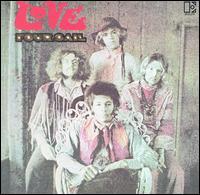Love's Final Elektra Release is Better in Retrospect
While Four Sail was an obligation owed to the old label (Elektra) after Lee had signed a new contract with Blue Thumb, and while Lee shows signs of losing his muse, the album has actually added luster over the years, as in hindsight, the brilliance of Lee’s eclectic, restless mind comes through with greater clarity, even as the originality hangs mostly on his arranging skills.
Coming a year after the epic and truly classic Forever Changes, the album was bound to disappoint fans and it did many. Lee had jettisoned the old gang and hooked up with a hard-edged but lithe power trio: George Suranovich (drums), Frank Fayad (bass) and Jay Donnellan (guitar). The album lacked the hard rocking edge of the first two Love albums, and the atmospherics of its predecessor. It slid jazzward while it veered all over the musical landscape, and it seemed to lack cohesion. In fact it did lack cohesion. While the direction may have been unclear, the many surprising turns lead to some dramatic and unexpected musical vistas that still please mightily.
Listening in retrospect a few things are obvious—including the records Lee was listening to (or which spun in his head) when he put the album together, which I bet include Rubber Soul, Daydream Moby Grape, Fresh Cream, Aftermath and Beggar’s Banquet, and at least one or more Spirit albums. I’d bet one of Lee’s all time favorite albums (or Bryan MacLean’s) was Gary McFarland’s Soft Samba (Verve V6-8603), a 1965 pop/jazz oddity where the jazz arranger sings “ba baya” s over soft, swinging bossa nova arrangements of tunes like “From Russia With Love,” some Beatles’s songs and a few others. Lee’s “ba bayas” backed by bossa novas are most obvious on “Orange Skies,” (from Da Capo), but they’re elsewhere, including on this album.
Beyond that, one can sense a jumpy Lee, reprising the quasi-Spanish, mysterious sounding motifs found on Forever Changes, but not building them into fully formed ideas.
For instance, while the opener “August,” begins with a trademarked Lee riff and melody that could have come from Forever Changes, instead of developing it, he delivers two verses and then lets the power trio rip with a blistering extended jam that could have come from a Cream album, or from the early Allman Brothers.
Lee follows with “Your Friend and Mine—Neil’s Song” a Spoonful like old-timey shuffle—a farewell to a friend who’d overdosed. The song takes on an ironic twist but only in retrospect. Among the lines Lee sings are “You don’t do nothing and you land in jail,” “They took all your money now look what they’ve done for you and, “Save a little space for me.” Lee later landed in jail on trumped up gun charges and of course had his own bout with drug abuse.
The wistful “I’m With You,” is perhaps the album’s most fully realized track, combining all of Lee’s winning musical signatures set to a sophisticated pseudo-bossa nova beat.
“Good Times,” the next track begins as a breezy, jazzy number, but after a pause, shifts into a John Lee Hooker-like jam that recycles the Grape’s “Hey Grandma.” The side ends with “Singing Cowboy,” another odd hybrid of jazz, country and rock that ends by obliquely quoting The Rolling Stones. An interesting LP side of a contractual obligation!
“Robert Montgomery,” is Lee’s major reworking of The Beatles’s “Eleanor Rigby,” and despite its obvious root, listening to Lee’s twisting and turning is endlessly pleasurable.
It’s fun now hearing Lee and the trio giving it back to Hendrix with love on “Talking In My Sleep.” No doubt Hendrix had been influenced by Lee and the first Love album, which came out well before Are You Experienced. The closer, “Always See Your Face,” is one of Lee’s most affecting, melancholic tunes.
While Four Sail is not peak Arthur Lee it is still vintage Lee compared to his later albums, which don’t measure up to the Elektra material. Time has been very kind to this record. It’s actually more enjoyable in retrospect, especially the trio’s tasteful and skillful playing.
Sonically, this was never a great sounding record, being a bit dark and distant, but it also has fine clarity, reasonably good transparency, and is very skillfully mixed. Thankfully, Sundazed chose not to revise history, and this reissue remains quite faithful to the original. Sonic differences between this and the red label Elektra edition were insignificant.
Recommended, as is Sundazed’s 13 track reissue of Love’s Revisited compilation album (LP5104)—a great way to discover the group if you’re not familiar.



